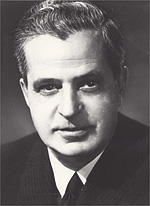Jean-Jacques Bertrand facts for kids
Quick facts for kids
Jean-Jacques Bertrand
|
|
|---|---|
 |
|
| 21st Premier of Quebec | |
| In office October 2, 1968 – May 12, 1970 |
|
| Monarch | Elizabeth II |
| Lieutenant Governor | Hugues Lapointe |
| Deputy | Jean-Guy Cardinal |
| Preceded by | Daniel Johnson Sr. |
| Succeeded by | Robert Bourassa |
| Deputy Premier of Quebec | |
| In office 1966–1968 |
|
| Premier | Daniel Johnson Sr. |
| Preceded by | Paul Gérin-Lajoie |
| Succeeded by | Jean-Guy Cardinal (1968) |
| MNA for Missisquoi | |
| In office July 28, 1948 – February 22, 1973 |
|
| Preceded by | Henri Gosselin |
| Succeeded by | Glendon Pettes Brown |
| Personal details | |
| Born | June 20, 1916 Sainte-Agathe-des-Monts, Quebec, Canada |
| Died | February 22, 1973 (aged 56) Montreal, Quebec, Canada |
| Political party | Union Nationale |
| Spouse |
Gabrielle Bertrand
(m. 1944) |
| Profession | Lawyer |
Jean-Jacques Bertrand was an important Canadian politician. He was the 21st Premier of Quebec, which is like the leader of the government in the province of Quebec. He served from October 1968 to May 1970. He was also the leader of a political party called the Union Nationale.
Contents
Early Political Career
Jean-Jacques Bertrand was born on June 20, 1916, in Sainte-Agathe-des-Monts, Quebec. He became a lawyer before entering politics.
Serving in the Legislature
Bertrand was elected as a Member of the Legislative Assembly (MLA) for the area of Missisquoi. He held this position for a long time, from 1948 until he passed away in 1973.
Working in the Cabinet
From 1958 to 1960, Bertrand served as the Minister of Lands and Forestry. He also briefly worked as the Minister of Youth and Social Welfare. His party, the Union Nationale, lost the provincial election in 1960, so he left these roles.
In 1961, Bertrand tried to become the leader of the Union Nationale party. However, he was defeated by his colleague, Daniel Johnson, Sr..
When the Union Nationale party returned to power in 1966, Premier Daniel Johnson, Sr. chose Bertrand to be part of his Cabinet. Bertrand became the Education Minister until 1967 and the Minister of Justice until 1968. He was also Johnson's Deputy Premier, which is like a second-in-command.
Becoming Premier of Quebec
In 1968, Premier Daniel Johnson, Sr. sadly passed away. Jean-Jacques Bertrand was then chosen as the temporary leader of the party and became the Premier of Quebec.
Party Leadership and Divisions
In 1969, a special meeting was held to choose a permanent party leader. Bertrand won with 58% of the votes, beating Jean-Guy Cardinal. This victory caused some disagreements within the party.
Daniel Johnson, Sr. had been open to ideas about Quebec having more independence. However, Bertrand clearly supported federalism, meaning he believed Quebec should remain a strong part of Canada. Cardinal was seen as the candidate who wanted more independence for Quebec. After Cardinal lost, some of his supporters left the Union Nationale party and joined the Parti Québécois.
Language Laws and Changes
The Union Nationale party also faced challenges because of a new language law passed in 1969, called Bill 63. This law aimed to solve a problem in the public schools of Saint-Léonard. It allowed parents to choose if their children would be taught in English or French. This made many Quebec nationalists upset.
Because of this law, two MLAs from the Union Nationale, Jérôme Proulx and Antonio Flamand, left the party and became independent politicians. They did this to protest the new law, along with other politicians like René Lévesque and Yves Michaud.
Later, Bill 63 was replaced by other language laws: Robert Bourassa's Bill 22 in 1974 and René Lévesque's Bill 101 in 1977.
Other Achievements
During Bertrand's time as Premier, the Legislative Council of Quebec was removed. This council was similar to the Canadian Senate but for Quebec. After this change, Quebec's main law-making body became known as the National Assembly of Quebec.
Leader of the Opposition
In the 1970 election, the Union Nationale party lost to Robert Bourassa's Liberals. Even though the Union Nationale became the Official Opposition, they finished third in the total number of votes. The party never fully recovered from this defeat and no longer exists today.
A year later, in 1971, Bertrand stepped down as the leader of the Union Nationale. He received an honorary doctorate from Sir George Williams University, which is now Concordia University. He passed away in February 1973.
Family Life
Jean-Jacques Bertrand's son, Jean-François Bertrand, also became a politician. He was a Member of the National Assembly for the area of Vanier from 1976 to 1985. He also served in the Cabinet of René Lévesque's Parti Québécois government.
Bertrand's wife, Gabrielle, was also a politician. She served as a Progressive Conservative Member of Parliament for the area of Brome—Missisquoi from 1984 to 1993.
See also
- Politics of Quebec
- List of Quebec general elections
- Timeline of Quebec history

